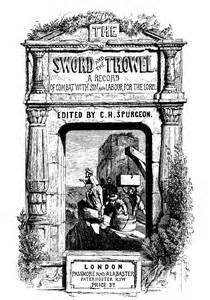Articles
Selected Articles
Worship or Entertainment?

How We Treat the Holy Spirit Within

The Merger of Calvinism with Worldliness

Are The Architects Of New Morality Affected By Conscience?

Spiritual Joy

The Dissolving of Doubts

The Biblical Grounds For Divorce

Will Believers Pass Through The Judgement?

Should churches comply with government instructions about coronavirus?

The Cancer in all Human Relationships

Recognising and Responding to Seasons of Exceptional Apostasy

The Awesome God


The Sword & Trowel magazine was started in 1865 by C. H. Spurgeon.
Currently it enjoys an extensive readership throughout the world, especially among ministers and church leaders. The current editor is Dr Peter Masters.
Each issue of the Sword & Trowel includes a new book. The large number of subscribers enables both magazine and books to be produced at an extremely low price.
Via the buttons above you can make a personal or gift subscription to Sword & Trowel, and pay via PayPal or credit/debit card, or over the telephone.
Subscription Rates
UK subscribers
£14 for 4 issues
£13 for 4 issues to Pastors
Overseas surface mail
£16 for 4 issues
£15 for 4 issues to Pastors
Charges are reduced where multiple copy subscriptions are taken up. Please enquire here or call 020 7840 1968
Previous Sword & Trowel editions
Article excerpts on preaching by Dr. Peter Masters
From Regeneration and Gospel Persuasion
We begin with Paul disputing with people at Athens (Acts 17), meaning that he laid out his case to convince people of their need of Christ. He presented arguments and reasoned with them. At Corinth also he reasoned and persuaded constantly (Acts 18.4), eventually being charged with persuading people to worship God (Acts 18.13). Apollos also mightily convinced people (lit: with well-stretched arguments, utterly proving his case).
In Acts 19.8-9 there are two references to disputing and one to persuading, showing the degree of reasoned convincing and remonstrating carried out by Paul at Ephesus. Before Felix, Paul famously ‘reasoned of righteousness, temperance, and judgment to come’, until Felix trembled (Acts 24.25). This was typical apostolic preaching. Even when a prisoner, Paul turned the dock into a pulpit and persuaded his hearers. At the very close of Acts (28.23), Paul was still persuading and reasoning – to the very end.
Are we preachers? Have we cultivated our skill in reasoning? Paul goes so far as to say – ‘Knowing therefore the terror of the Lord, we persuade men’ (2 Corinthians 5.11). We are called to make a persuasive presentation of the Gospel because it is God’s way of bringing the redeemed into his kingdom. When we are gathered into eternal glory, our cry of gratitude will be, ‘I was humbled to the dust; I felt my spiritual emptiness and need; I saw my desperately sinful state; I grasped how evil and foolish I was; I saw the Christ of Calvary, and I came to him longingly, willingly and freely for salvation.’
It is the will of God that preachers, witnessing believers, and the printed page, should be instrumental in this. Of course, the vital work is performed by the Lord, so the apostle rises no higher than saying, ‘we are labourers together with God.’ But we are his spokespeople.
Do you wrestle with souls as a preacher? It is a wonderful calling to search the Scripture, foraging for evangelistic arguments and parallels to salvation in both Testaments.
The hallmark of the Reformation was evangelistic preaching. And soon afterward the Puritans reasoned with, appealed to and expostulated with souls. Evangelistic preaching was a defining characteristic of the rise of the Baptists, particularly through the golden age of Baptist expansion. We may read the classic sermons of John Bunyan to see the tender affection for souls, and the striving to gain them.
It was also the hallmark of preaching in the 18th-century Great Awakening (read the sermons of George Whitefield), not to mention the revivals of the 19th century and the high era of the Victorian pulpit, with all its persuasiveness.
From Expository Preaching – Benefits and Pitfalls
What exactly is expository preaching? It is preaching that draws the message from the biblical text, clearly and methodically, honouring the sense of the text, and the style of communication employed. Before looking at classic examples from sermons of C H Spurgeon, here are some of the benefits and common mistakes of consecutive expository preaching.
Firstly, if the preacher works through a book of the Bible week by week it becomes obvious to everyone that the Word of God is the supreme authority for all that is taught. The preacher is clearly in captivity to the Bible. Consecutive expository preaching is the greatest witness to biblical authority.
A second virtue of consecutive expository preaching is that it helps the preacher to suppress his personal opinions. Because he is dominated by the Scripture, and bound to follow its presentation of information and its arguments, the preacher’s personal style of reasoning should be helpfully subordinated to that of God’s Word.
A third virtue of consecutive expository preaching is that it obliges the preacher to present everything that is in the Scripture. By nature, most preachers will tend to emphasise a certain group of subjects and to neglect others. But by proceeding through a book they are bound to address every topic that presents itself, and so preach on a comprehensive range of vital themes.
A fourth virtue of consecutive expository preaching is that it shows the people of God the plan and the purpose of a whole Bible book, which would probably not happen if the preacher darted from book to book selecting individual sermon texts. Think of the immense advantage to the people of God of becoming familiar with the overall scheme of entire books of the Bible. It is a very great help to private study.
Fifthly, consecutive expository preaching also enables the preacher to bring out the themes that often run through one or more chapters. He pays more attention to the context, and this delivers him from many mistakes. Would the so-called ‘holiness movement’ have developed if its proponents had been consecutive preachers? Would they not have hesitated to preach sanctification-by-faith when they saw that the whole chapter or passage was speaking about justification?
















